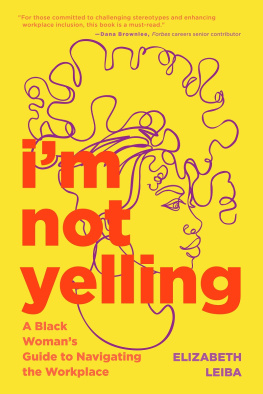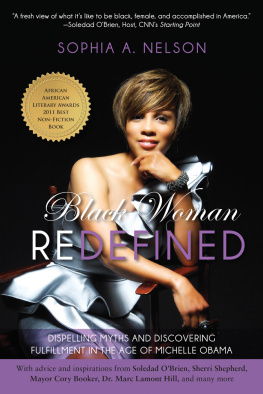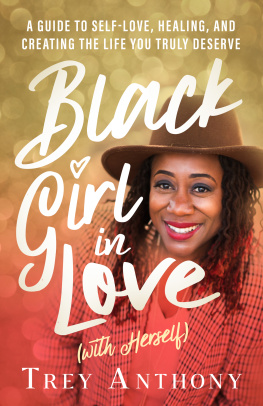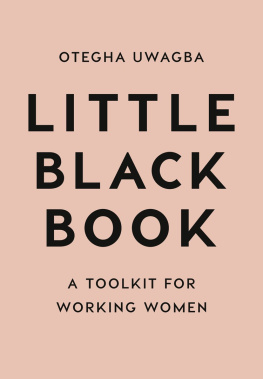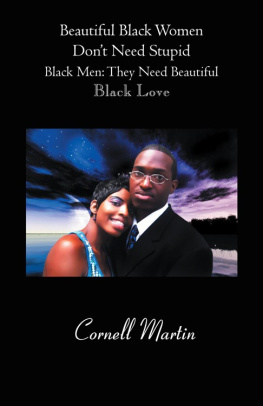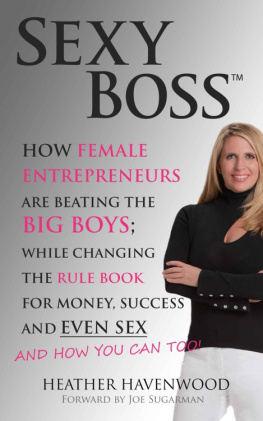All rights reserved, including the right to reproduce this book or portions thereof in any form whatsoever. The scanning, uploading, and distribution of this book without permission is a theft of the authors intellectual property. If you would like permission to use material from the book (other than for review purposes), please contact . Thank you for your support of the authors rights.
Disclaimer: I am not a mental health professional or financial advisor. All content should not be considered professional medical or financial advice. Please note that content in this book includes sensitive topics around mental health and suicide. If you are in distress, please get in touch with a professional by texting HOME to 741741.
Some names and identifying details have been changed.
Subjects: Non-fiction, Race, Entrepreneurship, Black Women, Self-Help, Women in Business
Introduction
In 2019 I had a chat with another Black woman, whom Ill call Rhonda, about being the only Black person in a mostly white workplace. We spoke about how isolating it is when no one looks like you, along with the pressure of feeling like you have to represent an entire race. Rhonda added though, an upside to a seat at the table as the only Black person. For her, a seat at the table offers an inside look at what they are talking about, and gives leverage to underrepresented folks in the room. Her stance echoed what I told myself while I spent over a decade trying to get a seat at the table. Through fierce determination (and a little bit of luck), I eventually obtained the coveted seat. Once I finally got to that seat, I expected something magical to happen. Surely, I thought, the others at the table would be awed by the blood, sweat, and tears it took for me to be there.
Theyd recognize my brilliance, talent, and tireless work ethic, and quickly implement the ideas I had to make improvements, which would pave the way for others like me to get to the table. Imagine my disappointment, when that magic ceased to ever materialize. Instead, the white people at the table smiled and greeted me warmly, but never acknowledged the fact there was no one around who looked like me. They asked for my input on how to be more inclusive, only to continue with the same practices. When I shared ideas, they spoke over me, interrupted me, or ignored me completely. Eventually they stopped asking for my input altogether.
This made me question why I was so focused on being at the table in the first place. After years of denied opportunities and barriers set in front of Black folks long before I existed, what made me think anything would change once I finally got in? How did I know if I was even getting a true inside perspective on what they were talking about? After all, wouldnt it be easy to withhold information because they knew I felt indebted just to be there?
These questions raced through my mind daily, leading to mental and physical exhaustion. I wondered if I was really brilliant or talented. Maybe my work ethic wasnt as great as I thought? The only rewards for my contributions were microaggressions and more tasks added to the workload. Is this what I worked so hard to be a part of? After years of working to get into the exclusive spaces that rarely make room for people like me, reality sank in:
They didnt want me there.
When I say they didnt want me, I mean me as an individual. They certainly wanted a person of color to be there, specifically a Black woman, to mark off another box on their diversity checklist. They were happy to have me while I displayed mannerisms that made them comfortable.
But they didnt want me there if I asked too many questions. Or if I raised my voice. Or if I refrained from small talk because my mind was distracted by news of another Black body being shot down. They didnt want all of the parts that make me me.
So I left the table.
My physical and mental wellbeing is a bigger priority than trying to fit the standards of whiteness. Plus, I believe Black people are brilliant enough, talented enough, and creative enough, to build our own table. We dont have to claw our way to a spot at tables full of hatred and bias toward us being there. Our value is too great to be limited by the spaces still unconcerned with whether we succeed or fail.
I understand some Black folks still want a seat at the table. Rejecting the table is a scary move to make, and one that holds an unknown amount of risk. Id rather take a chance and build a table for others like me, than fight to be at one where Im not welcome.
I wrote these words days after I traded my job for entrepreneurship in April 2019. Before I quit, I tried to ignore the microaggressions, office politics, and subtle racism at work, for the sake of a steady income. The problem though, was that I became a shell of myself with each day of increasing toxicity. Instead of feeling confident about my skills, I fretted over every project as an outcome of my bosss ego-fueled criticism.
Five months into the job, I learned I had high blood pressure during a routine doctors visit and was immediately put on medicationat the age of 32. This jarring wake-up call proved the ignore red flags tactic was a serious threat to my health. Do I want to be miserable for years to meet my career goals? I asked myself. Am I willing to emotionallyand even physicallydie for a paycheck?
If youve read this far, you know the answer to that. While playing the game at a 9-to-5 seems like the best bet, working for yourself can actually be less risky when youre a Black woman. For years, I thought working for someone else was my only option to make a living. Once I discovered the world of entrepreneurship, it opened my mind to a different approach that fit my personality and lifestyle goals.
Working Twice as Hard serves as a guide for Black women on the path of entrepreneurship, or who dont know where to start. I wont lie: Being an entrepreneur is hard. Being Black is hard. And being a woman is hard. When youre all three, your chances of success move farther and farther out of reach, contrary to what our pull yourself up by the bootstraps culture tells you. This book offers insight on how to make strategic moves to sustain yourself as an entrepreneur.
Each chapter breaks down a specific aspect of entrepreneurship and how it impacts Black women, including mental health, finance, and running a business in the digital age. Youll read my personal anecdotes as an entrepreneur, along with stories from other Black women. I share data to back up our stories (for all my fellow research nerds!), followed by practical tips to help you avoid the mistakes I made. As the future of the workplace shifts due to events like the COVID-19 pandemic, business savvy provides an extra layer of protection in an unstable economy. Whether you choose to work a traditional job and build a business on the side, or pursue self-employment full-time, entrepreneurial skills are crucial to stay competitive in the rapidly changing climate.
Most of all, I wrote this book to validate Black women going through what I did. As I progress through my career, I realize how harshly I've been treated, simply for being a Black woman. Every day we show up at jobs that tell us we're too loud, too opinionated, too bossy, too assertive. But it's not us. It's the toxic work culture that gaslights us and tries to keep us quiet at every turn. I'll speak for the Black women who dont have the words to describe their own experience. My hope is for us as Black women to shift our focus from the 9-to-5 grind, to building our own legacies.


